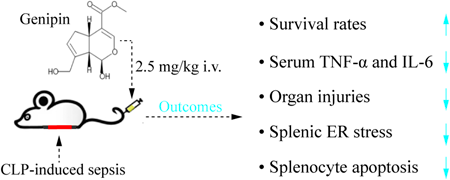- 著者
- Ning Luo Gui-bing Chen Teng Zhang Jie Zhao Jing-nan Fu Ning Lu Tao Ma
- 出版者
- The Pharmaceutical Society of Japan
- 雑誌
- Biological and Pharmaceutical Bulletin (ISSN:09186158)
- 巻号頁・発行日
- vol.46, no.2, pp.187-193, 2023-02-01 (Released:2023-02-01)
- 参考文献数
- 47
- 被引用文献数
- 1 3
Endoplasmic reticulum (ER) dysfunction is characterized by ER stress, which can be triggered by sepsis. Recent studies have reported that lessening ER stress is a promising therapeutic approach to improving the outcome of sepsis. Genipin is derived from gardenia fruit, which is a traditional Chinese medicinal herb for anti-inflammation. Here, mice were treated with genipin (2.5 mg/kg) intravenously to assess its biological effects and underlying mechanism against polymicrobial sepsis. Furthermore, the present study focused on detecting the levels of ER stress-related proteins, including protein kinase R-like ER kinase (PERK), glucose-regulated protein of 78 kDa (GRP78), phosphorylated-eukaryotic initiation factor 2α (p-eIF2α), and CCAAT/enhancer binding protein (C/EBP) homologous protein (CHOP). The results demonstrated that genipin significantly decreased the serum concentrations of tumor necrosis factor-α and interleukin-6, alleviated histopathological damage to the lungs, livers and spleens, and even improved the survival rates of septic mice. Moreover, sepsis significantly upregulated the protein expression levels of splenic GRP78, PERK, p-eIF2α and CHOP, but their levels were significantly suppressed by genipin. Furthermore, genipin also significantly downregulated cleaved caspase-3 expression levels and reduced sepsis-induced splenocyte apoptosis. In conclusion, genipin potentially improved the survival rate of sepsis and attenuated sepsis-induced organ injury and an excessive inflammatory response in mice. The effects of genipin against sepsis were potentially associated with decreased splenocyte apoptosis via the attenuation of sepsis-induced ER stress to further inhibit ER stress-induced apoptosis.
